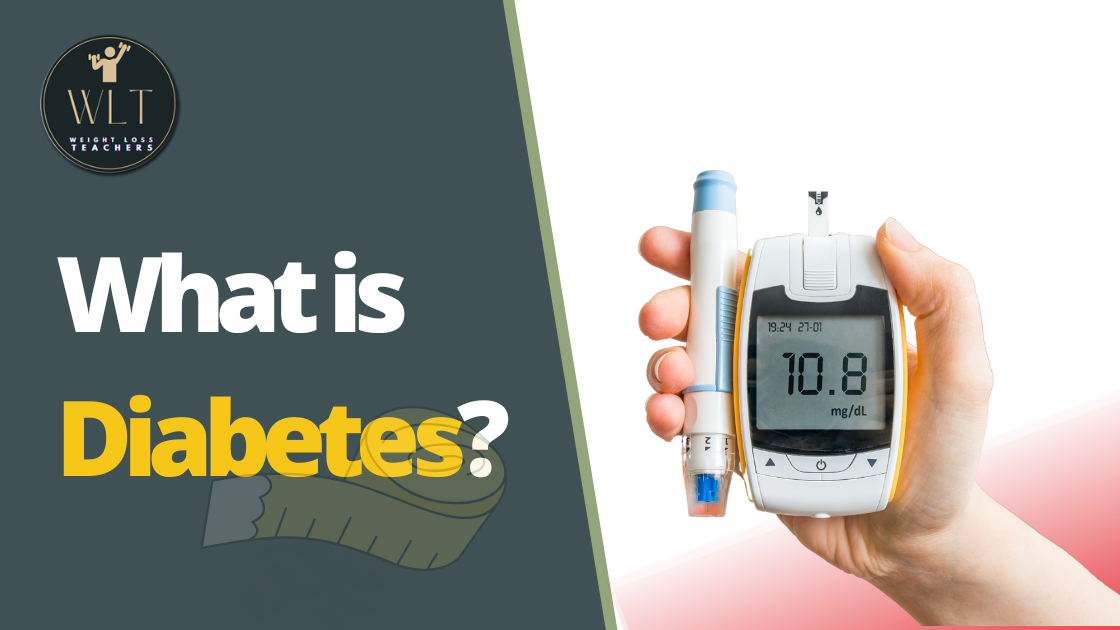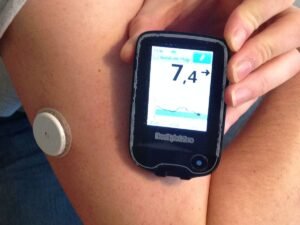
What is Diabetes?
Diabetes is a chronic condition that affects millions of people worldwide. It is a metabolic disorder that occurs when the body cannot produce or properly use insulin, a hormone that regulates blood sugar levels.
Ever wondered what diabetes truly is and how it affects the body? Diabetes is a chronic condition that occurs when the body cannot properly regulate blood sugar levels. This imbalance can lead to various health complications if not managed effectively. There are different types of diabetes, including Type 1, Type 2, and gestational diabetes, each with its own causes and characteristics. Understanding the basics of diabetes is essential for prevention and management. Dive into the world of diabetes and learn how to maintain a healthy lifestyle with this condition.
Table of Contents
What is Diabetes?

Diabetes is a condition in which the body is unable to produce or use insulin effectively. Insulin is a hormone produced by the pancreas that regulates blood sugar levels. When you eat, your body breaks down carbohydrates into glucose, which is then absorbed into the bloodstream.
here’s a summary of the main types of diabetes in tabular form:
| Type of Diabetes | Description |
|---|---|
| Type 1 Diabetes | An autoimmune condition where the body’s immune system attacks insulin-producing cells in the pancreas. |
| Type 2 Diabetes | A condition where the body becomes resistant to insulin or doesn’t produce enough insulin, often linked to lifestyle factors. |
| Gestational Diabetes | Diabetes that develops during pregnancy and usually resolves after childbirth, but increases the risk of developing Type 2 diabetes later in life. |
| Prediabetes | A condition where blood sugar levels are higher than normal but not high enough to be classified as Type 2 diabetes. |
| Diabetes Insipidus | A rare condition where the kidneys are unable to conserve water, leading to excessive thirst and urination. |
Insulin helps move glucose from the bloodstream into the cells, where it can be used for energy. If your body doesn’t produce enough insulin or if your cells become resistant to insulin, glucose can build up in your bloodstream, leading to high blood sugar levels.
Types of Diabetes

There are three main types of diabetes: type 1, type 2, and gestational diabetes.
Type 1 Diabetes
Type 1 diabetes is an autoimmune condition in which the immune system attacks the cells in the pancreas that produce insulin. This results in little or no insulin production, which means that people with type 1 diabetes need to take insulin injections or use an insulin pump to regulate their blood sugar levels.
Type 2 Diabetes
Type 2 diabetes is the most common form of diabetes and occurs when the body becomes resistant to insulin or doesn’t produce enough insulin to regulate blood sugar levels. Type 2 diabetes is often linked to lifestyle factors such as poor diet, lack of exercise, and obesity.
Gestational Diabetes
Gestational diabetes occurs during pregnancy and affects about 4% of pregnant women. This type of diabetes usually goes away after the baby is born, but women who have had gestational diabetes are at higher risk of developing type 2 diabetes later in life.
Symptoms of Diabetes

The symptoms of diabetes can vary depending on the type of diabetes and the severity of the condition. Some common symptoms of diabetes include:
- Frequent urination
- Increased thirst
- Hunger
- Fatigue
- Blurred vision
- Slow healing of cuts or bruises
- Numbness or tingling in the hands or feet
- Recurring infections, such as urinary tract infections
If you are experiencing any of these symptoms, it is important to see your healthcare provider for an evaluation.
Complications of Diabetes

If left untreated, diabetes can lead to a variety of complications, including:
- Cardiovascular disease
- Kidney damage
- Eye damage
- Nerve damage
- Foot damage
- Skin conditions
- Hearing impairment
It is important to manage diabetes properly to reduce the risk of developing these complications.
Natural Remedies for Diabetes

While there is no cure for diabetes, there are many natural remedies that can help manage the condition and improve overall health. Here are some natural remedies for diabetes:
Managing diabetes effectively requires a comprehensive approach that includes medical treatment, lifestyle changes, and natural remedies. While these natural remedies can be beneficial, it’s important to consult with a healthcare provider before making any significant changes to your treatment plan. Here are some natural remedies that may help manage diabetes:
1. Diet and Nutrition
Low-Carb Diet: Reducing carbohydrate intake can help control blood sugar levels. Focus on whole, unprocessed foods like vegetables, lean proteins, and healthy fats. This approach can prevent spikes in blood sugar levels and promote overall health.
Here’s a summary of diet and nutrition components for effective health management in tabular form:
| Component | Description |
|---|---|
| Low-Carb Diet | Reducing carbohydrate intake to help control blood sugar levels, focusing on whole, unprocessed foods like vegetables. |
| High-Fiber Foods | Including whole grains, legumes, fruits, and vegetables to regulate blood sugar levels and improve digestive health. |
| Healthy Fats | Incorporating sources of healthy fats like avocados, nuts, seeds, and olive oil to improve insulin sensitivity. |
| Hydration | Drinking plenty of water to stay hydrated and support overall health and metabolism. |
| Lean Proteins | Consuming lean proteins like chicken, fish, tofu, legumes, and low-fat dairy to support muscle maintenance and repair. |
| Portion Control | Managing portion sizes to prevent overeating and control calorie intake. |
| Regular Meals | Eating regular, well-spaced meals to maintain energy levels and avoid excessive hunger. |
| Healthy Snacks | Choosing nutritious snacks like fruits, nuts, yogurt, and vegetables over processed and sugary options. |
| Limit Added Sugars | Reducing consumption of foods and beverages high in added sugars to avoid empty calories and blood sugar spikes. |
| Whole Foods | Focusing on whole, minimally processed foods to ensure nutrient density and avoid excessive calories and additives. |
| Micronutrient-Rich Foods | Including a variety of foods rich in vitamins and minerals to support overall health and metabolic function. |
| Reduced Refined Carbs | Limiting intake of refined carbohydrates like white bread, pastries, and sugary cereals to maintain stable blood sugar levels. |
Adopting these dietary principles can support overall health and well-being while effectively managing conditions like diabetes.
High-Fiber Foods: Foods high in fiber, such as whole grains, legumes, fruits, and vegetables, can help regulate blood sugar levels. Fiber slows down the digestion and absorption of carbohydrates, leading to a more gradual rise in blood sugar.
“The doctor of the future will no longer treat the human frame with drugs, but rather will cure and prevent disease with nutrition.” – Thomas Edison
Healthy Fats: Incorporate sources of healthy fats, like avocados, nuts, seeds, and olive oil, which can improve insulin sensitivity. These fats are also beneficial for heart health, which is crucial for people with diabetes.
Hydration: Staying hydrated is essential for overall health and can help manage blood sugar levels. Drinking plenty of water helps the kidneys flush out excess sugar through urine.
2. Physical Activity
Regular Exercise: Engaging in regular physical activity, such as walking, jogging, swimming, or cycling, can help improve insulin sensitivity and lower blood sugar levels. Exercise helps muscles use glucose for energy, reducing blood sugar levels.
Strength Training: Incorporating strength training exercises can help build muscle mass, which in turn increases resting metabolic rate and helps manage blood sugar levels. More muscle mass means more glucose uptake by muscles.
3. Stress Management
Mindfulness and Meditation: Practices like mindfulness, meditation, and yoga can help reduce stress, which can have a positive impact on blood sugar levels. Stress hormones can increase blood sugar levels, so managing stress is crucial.
Adequate Sleep: Ensuring you get enough quality sleep is crucial for overall health and can help regulate blood sugar levels. Poor sleep can affect insulin sensitivity and blood sugar control.
4. Herbs and Supplements
Cinnamon: Some studies suggest that cinnamon may help lower blood sugar levels and improve insulin sensitivity. It can be added to meals or taken as a supplement.
Ginseng: Ginseng has been shown to have potential benefits for blood sugar control in some studies. It’s available in various forms, including teas and supplements.
Magnesium: Magnesium supplements may help improve insulin sensitivity and blood sugar control. Foods rich in magnesium include leafy green vegetables, nuts, and whole grains.
Aloe Vera: Aloe vera has been studied for its potential to lower blood sugar levels. It’s available in juice form and as a supplement.
Fenugreek: Fenugreek seeds have been shown to help lower blood sugar levels in some studies. They can be soaked in water overnight and consumed in the morning.
5. Probiotics
Probiotic Foods: Consuming probiotic-rich foods like yogurt, kefir, and fermented vegetables can help improve gut health, which may have a positive impact on blood sugar control. A healthy gut microbiome can influence metabolism and insulin sensitivity.
6. Monitoring and Tracking
Blood Sugar Monitoring: Regularly monitoring blood sugar levels can help you understand how different foods, activities, and stress levels affect your blood sugar. This information is vital for making informed decisions about your diet and lifestyle.
Food Diary: Keeping a food diary can help you track your diet and identify patterns that may affect your blood sugar levels. It can also help you stay accountable and make healthier choices.
7. Professional Guidance
Consult a Healthcare Provider
Manage Your Diet
One of the most important natural remedies for diabetes is to manage your diet. Eating a healthy diet can help regulate blood sugar levels and improve overall health. Here are some dietary tips for managing diabetes:
- Choose complex carbohydrates, such as whole grains, fruits, and vegetables, over simple carbohydrates, such as candy and soda.
- Avoid foods that are high in saturated fat and cholesterol, such as red meat, butter, and fried foods.
- Eat foods that are high in fiber, such as whole grains, fruits, and vegetables.
- Limit your intake of sugary foods and drinks.
- Eat small, frequent meals throughout the day to help regulate blood sugar levels.
Exercise Regularly
Exercise is another important natural remedy for diabetes. Regular physical activity can help regulate blood sugar levels, improve insulin sensitivity, and reduce the risk of developing complications. Here are some tips for incorporating exercise into your diabetes management plan:
- Aim for at least 30 minutes of moderate-intensity exercise, such as brisk walking, cycling, or swimming, most days of the week.
- Consider incorporating strength training exercises, such as weightlifting or resistance band exercises, into your routine to help build muscle and improve insulin sensitivity.
- Always talk to your healthcare provider before starting a new exercise program.
Manage Stress
Stress can have a negative impact on blood sugar levels and overall health. Managing stress through techniques such as meditation, deep breathing, and yoga can help improve diabetes management and reduce the risk of developing complications.
Get Enough Sleep
Getting enough sleep is essential for overall health and diabetes management. Sleep deprivation can lead to increased insulin resistance and higher blood sugar levels. Aim for 7-8 hours of sleep per night to help regulate blood sugar levels and improve overall health.
Note: There might be affiliate links mentioned here. We may receive a commission if you purchase a product through an affiliate link. There is no additional charge for you. Please do your own research before making any online purchases.
Use Natural Supplements

There are several natural supplements that may help manage diabetes. These include:
Chromium:
Chromium is a mineral that may improve insulin sensitivity and help regulate blood sugar levels.
Cinnamon:
Cinnamon may help lower blood sugar levels and improve insulin sensitivity.
Alpha-lipoic acid:
Alpha-lipoic acid is an antioxidant that may help reduce oxidative stress and improve insulin sensitivity.
Always talk to your healthcare provider before taking any new supplements.
Quit Smoking
Smoking can have a negative impact on diabetes management and overall health. Quitting smoking can help improve diabetes management and reduce the risk of developing complications.
Drink Plenty of Water
Drinking plenty of water can help regulate blood sugar levels and improve overall health. Aim for at least 8-10 glasses of water per day.
Conclusion
Diabetes is a chronic condition that requires careful management to reduce the risk of developing complications. While there is no cure for diabetes, there are many natural remedies and lifestyle changes that can help manage the condition and improve overall health. Managing your diet, exercising regularly, managing stress, getting enough sleep, using natural supplements, quitting smoking, and drinking plenty of water are all important steps in managing diabetes naturally. Always talk to your healthcare provider before making any changes to your diabetes management plan.
Disclaimer: The information provided in this article is for educational purposes only and should not be considered as a substitute for medical advice. Consult a healthcare professional before implementing any home remedies or making significant changes to your lifestyle.
FAQs
What are the main types of diabetes?
The main types of diabetes are Type 1, Type 2, and gestational diabetes. Each type has different causes and treatment methods.
What causes diabetes?
Diabetes can be caused by genetic factors, autoimmune reactions, lifestyle choices, and other underlying health conditions.
What are common symptoms of diabetes?
Common symptoms include increased thirst, frequent urination, extreme fatigue, blurry vision, and unexplained weight loss.
How is diabetes diagnosed?
Diabetes is diagnosed through blood tests that measure glucose levels, such as the fasting plasma glucose test and the A1C test.
How can diabetes be managed?
Diabetes management involves monitoring blood sugar levels, maintaining a healthy diet, regular exercise, and, in some cases, medication or insulin therapy.


